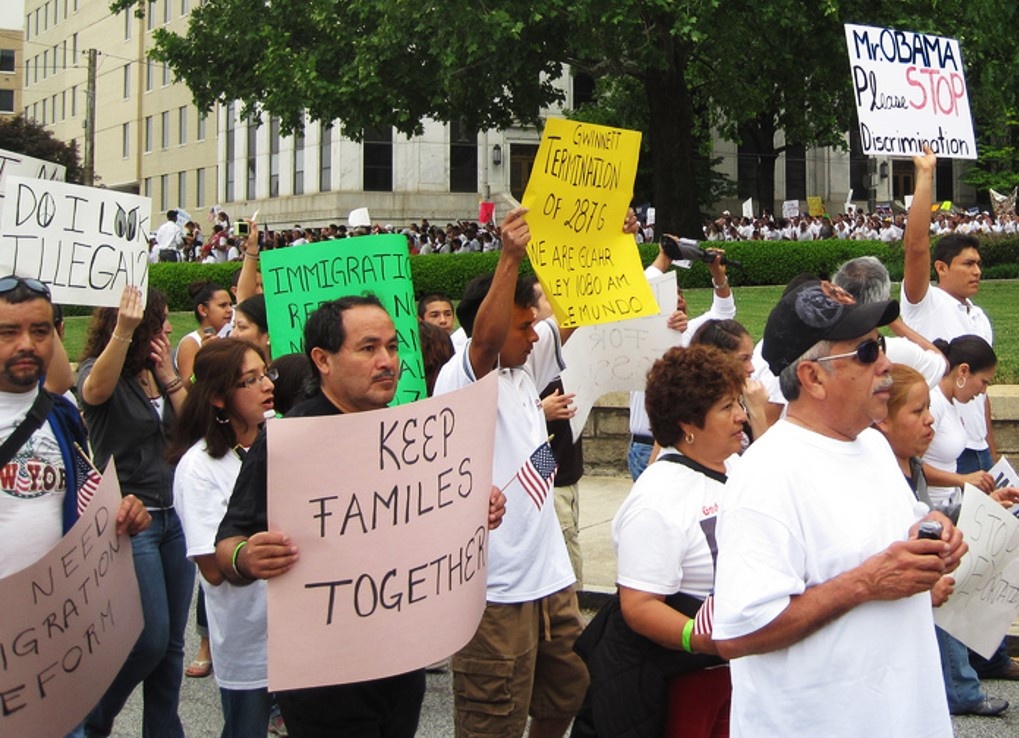Facing a Trump presidency, South's immigrant advocates build on networks of resistance

Facing the prospect of harsh policies under a Trump administration, immigrant rights advocates across the South hope to mobilize a growing movement that has fought back against state and local anti-immigrant initiatives. (Photo of a 2010 immigrants rights rally in Atlanta by Matthew Bosisio via via Flickr.)
Immigrants have been the target of hateful rhetoric and actions since President-elect Donald Trump launched his campaign over a year ago. Galvanizing his base with promises to build a wall along the U.S.-Mexico border and to ban Muslim immigration, Trump has dramatically shifted the tone of the national conversation on immigration and raised fears that he'll follow through on his harshest campaign promises.
What a President Trump will actually do around federal immigration policy remains unclear. In a recent interview with Time magazine, he scaled back his rhetoric, expressing some openness to "work something out" with beneficiaries of President Obama's 2012 Deferred Action for Childhood Arrivals (DACA) program, which gives certain undocumented immigrants brought to the U.S. as children temporary work permits and reprieves from deportation.
At the same time, Trump has been adamant that he will deport what he says are at least 2 million undocumented immigrants with criminal convictions — even though the Migration Policy Institute estimates there are only about 820,000 undocumented immigrants with criminal records.
Some of Trump's appointments also suggest he'll hew to a hardline approach. Among his transition advisers is Kansas Secretary of State Kris Kobach, who helped write legislation cracking down on immigrants in Arizona and elsewhere. And Trump's pick for attorney general is U.S. Sen. Jeff Sessions, an Alabama Republican who has opposed proposals to give undocumented immigrants a pathway to citizenship.
What does all this mean for immigration issues in the South — a region that's now home to some of the fastest-growing immigrant communities in the country, and where Trump won every state but Virginia?
The South has been dominated by anti-immigrant lawmakers who have targeted immigrant communities.
In some ways, not much will change. The South has been dominated by anti-immigrant lawmakers who, as the numbers of immigrants in the region have grown, have introduced and passed legislation at the local and state level to target their communities. These have ranged from English-only decrees and bans on Islamic Sharia law to laws modeled after Arizona's infamous SB 1070 ordering immigrants to carry registration papers at all times and requiring state law enforcement officers to determine the immigration status of people they stop.
Local communities in the South have also participated in federal programs like 287(g) and Secure Communities, which involve local police in federal immigration enforcement. While many of the nation's largest cities and entire states like California have adopted so-called sanctuary policies to limit local involvement in federal immigration enforcement to avoid creating rifts between police officers and the communities they protect, only a handful of Southern localities have adopted such measures, among them New Orleans and Miami.
Trump has pledged to withhold federal funding from places with such sanctuary policies, leaving many national advocates scrambling to protect their local wins. But in the South, several states have already passed such measures penalizing sanctuary communities.
Building on existing networks
"In many ways, our community has been under attack for a long time," said Adelina Nicholls of the Georgia Latino Alliance for Human Rights.
GLAHR, like many other grassroots immigrant advocacy groups across the South, has already organized in response to anti-immigrant hostility and has been fighting to protect communities from both the federal-local deportation apparatus as well as local and state anti-immigrant policies. GLAHR works with a network of comités populares — people's committees — across Georgia to organize families and communities around these efforts. Nicholls hopes to expand and mobilize this network in the face of what's expected to be stepped-up enforcement under a Trump administration.
"Nobody knows exactly what's coming next," Nicholls said. "But it's time for everybody to gather, to reflect, to organize."
"It's time for everybody to gather, to reflect, to organize." - Adelina Nicholls, GLAHR
In Arkansas, immigrant advocates are leveraging networks and immigrant resource centers they have built across the state in recent years in response to immigration raids and programs like 287(g), and to support those pursuing DACA and citizenship status. In a post-election environment where anti-immigrant bullying has escalated, the group is activating its community watch network to report incidents in neighborhoods and schools.
"We immediately transitioned from election to rapid response in response to the extreme panic we were feeling at all levels from our immigrant communities and allies," said Mireya Reith of the Arkansas United Community Coalition, an immigrant advocacy and support organization working in the state since 2010.
Reith is also reaching out to allies in local communities such as school leaders, elected officials, business owners and others with whom her organization has built relationships to stand with immigrant communities. There are signs that the work is paying off: Mayors of nine Arkansas communities who publicly took welcoming stances on immigration were all re-elected in 2016.
Organizing locally and building on the resistance efforts of recent years will be critical. While anti-immigrant rhetoric is nothing new for Southern immigrant advocates, losing a level of defense nationally still has implications for vulnerable communities and adds urgency to efforts to protect immigrant rights in areas where local anti-immigrant leaders may be emboldened by the national rhetoric.
"We need to be there for each other," said Stephanie Cho of Asian Americans Advancing Justice – Atlanta who organizes and advocates for Asian Americans and Pacific Islanders in the state.
"We need to be a place where we can actually make some real changes," she said. "It's not easy, but we have to keep going."
Tags
Allie Yee
Allie is a research fellow at the Institute for Southern Studies and is currently studying at the Yale School of Management. Her research focuses on demographic change, immigration, voting and civic engagement.
